Yes, there are alligators living in Lake Lanier.
Where is Lake Lanier?
In Northeast Georgia, Lake Lanier is a man-made lake created during the building of Buford Dam.
The dam construction blocked off this lake, which is located in Hall County, just half an hour north of Atlanta.
Lake Lanier Islands is a popular tourist destination in the summer when there is a resort and waterpark that opens up to the public right on the lake.
Others come from out of town to boat or swim in the water, where cabins and beach houses dot the lakeshore.
In fact, the local mall is called Lakeshore Mall!
In the winter months, when the park is transformed into a winter wonderland, people drive in and wait for 3 hours just to cruise through millions of holiday lights on display.
But to know that an alligator might be lurking in those sparkling displays might have you dismayed.
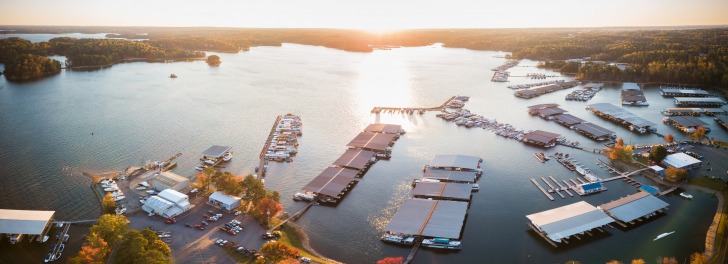
Contents
So… Are There Alligators in Lake Lanier?
Yes, naturally, alligators do live in Lake Lanier.
However, these reptiles are not native species to the waters here.
For starters, the lake was dammed up in the 1950s.
Before then, people resided in a town called Oscarville, which was primarily an African American community.
There was a large population of black carpenters, bricklayers, and other hand craftsmen who worked and lived in Oscarville prior to the flood.
Supposedly, the residents were relocated when the dam was constructed in order to flood the land for the lake, which is named after state poet Sidney Lanier who was born in Macon, GA in 1842.
Today, the lake continues to have an eerie connection to its past, even if locals do not generally discuss the black community that was there before the water was deep.
According to one source, “Many folks who live close by will tell you straight up, ‘Don’t go to Lake Lanier.” Why?
Newsone reports, “If you spend any time in or around Atlanta, you’ve heard tales of Lake Lanier.
There are eerie accounts of fishermen seeing ghostly kayaks floating on the water, or women with no hands roaming the Jerry D. Jackson Bridge.
Every so often, someone loses their life on the lake and leaves behind stories of good swimmers being snatched under the water, unexplainable boating accidents, or vehicles crashing into the lake without cause.”
I personally know of a child who drowned while riding jet skis on Lake Lanier.
While in middle school, a student in my grade and math class lost her brother in the water.
He was in elementary school and his death was difficult for a lot of students to understand because he was so young.
But he didn’t die because of an alligator in the lake.
In fact, if there are any species of alligators living in Lake Lanier, they are not native species to the waters.
No alligators are endemic to the region of northeast Georgia.
The alligators that live in south Georgia, though, are very capable of coming north at any time.
These alligators are home in the Okefenokee Swamp, covering nearly 450,000 acres of land in the southern part of GA and in northern Florida.
Visitors can boat along the swamp’s sulfuric waters and see alligators.
I took a canoe and toured the Okefenokee Swamp while in graduate school at Valdosta State University.
The state has a self-guided boat ride where anyone can take a canoe and go out into those alligator-infested waters.
Billy’s Island is at the end of the channel and you are able to dock your canoe and explore the century-old and abandoned mining town and its cemetery there.
I counted 30 alligators as I came into the waterway and made my way back down and out of the swamp.
Thirty alligators came at my canoe and hit up underneath the vessel because they were trying to flip it–and presumably eat me and my boating companions.
It was quite a rush, but I could not recommend the tour in good faith to anyone who has never been on a boat due to the close proximity of wild and hungry, and potentially angry, alligators.
That being said, it is very easy to see how the alligators that live in the Okefenokee Swamp can be around humans without everyone panicking.
The state park has even named a dozen or so of these alligators and is monitoring them.
The names?
Well, you can call one Sally, the other Laura Walker, one Cypress, and the other Audrey Laine…they seem to have a tag on the alligators at least!
Now, are these the same alligators you would expect to see swimming in Lake Lanier?
Not at all.
The odds, though, of seeing alligators in the lake are greatly increased by the number of alligators thriving only 400 miles south of them in the same state.
Alligator Species in Lake Lanier
The only time an alligator has been seen in Lake Lanier was years ago.
According to the Atlanta-Journal Constitution, “An alligator was sighted this week [in 2016] in Lake Lanier and it wasn’t the first time, officials say.”
A local news source added, “An alligator, which is estimated to be about 2-to-3-feet long, has been seen on the north end of Lake Lanier near Don Carter State Park.
According to the Georgia Department of Natural Resources, while the gator does not pose a threat to [the] public, people should still give the animal space.”
There is no indication of the species of alligator that was found back then.
However, in general, the American alligator is the alligator species living in southern Georgia.
This would be the most common alligator type to live in northern Georgia, as well.
Yet, as the news indicates, a sighting and report of an alligator in Lake Lanier today would be a very rare occasion.
Is it Safe to Swim in Lake Lanier?
It is not only safe to swim in Lake Lanier, thousands of Georgia residents flock to Lake Lanier Islands every summer to do just that.
There is a man-made sand beach perfect for swimming that allows swimmers to safely get into the water.
Additionally, watersports, including jet skis and boats, are all the rage at the lake.
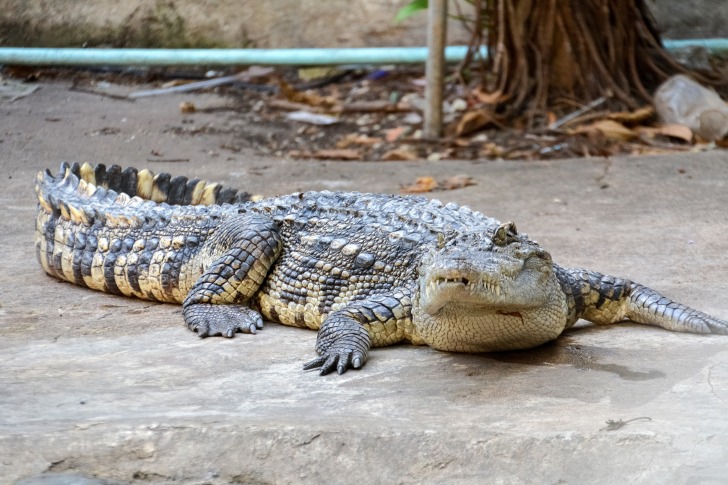
Interesting Alligator Facts in Lake Lanier
If you see an alligator in Lake Lanier, don’t fret too much.
This is a natural territory expansion.
But there is also the worry that this is an exotic species of alligator, such as a dwarf caiman.
These types of alligators are smaller than the American alligator and might be harder to identify.
You might also encounter a ghost alligator given the spooky history of this haunted lake.
If you see a white alligator, this could be the spirit of an alligator rather than the real version.
Alligators vs. Crocodiles
Alligators and crocodiles are two different types of the same-looking creature.
Are these reptiles or amphibians?
Even though alligators and crocodiles both primarily live in the water, they are reptiles because they have scales rather than smooth skin.
Amphibians must stay wet to stay alive, unlike alligators and crocodiles.
The reptilian species include crocs and gators, snakes, turtles, and lizards.
So what is the difference between an alligator and a crocodile?
An alligator will be found living in North or South America, while a crocodile mostly lives in Africa and Asia.
There are always exceptions, including the Florida Everglades, where both species of reptiles live.
Here, the only way to tell these two reptiles apart is by their snouts.
A crocodile has a pointy snout like a witch’s hat.
An alligator has a wider shovel-shaped snout that is shaped less like an A than you would expect.
I personally always find this snout shape to be confusing.
Therefore, it is easier to remember that alligators are associated with the sports team, Florida Gators, in North America.
Crocodiles are most commonly associated with the Nile River in Egypt, which is in northern Africa.
Other than the shape of their mouths and the geographical location of origin, there are few differences between crocodiles and alligators.
Alligators are smaller in weight and length, often half the size of a crocodile.
The croc is the largest of the reptiles still inhabiting this earth since the days of the dinosaurs–their distant relatives.
3 Safety Tips for Swimming in Alligator-Infested Waters
- Do not feed the gator. If you are swimming in water with alligators, the last thing you want to do is associate yourself with their lunch menu. Baiting alligators is an even dumber move to make if you are hoping to survive.
- Stay on top of the water on a boogie board or paddle board if possible, rather than swimming in the actual waters infested by alligators. Stand-up paddle boards or SUPs are increasingly popular and can even be equipped with seats. Just keep your feet up off of the sides if you are seated so the alligator does not confuse you with another gator.
- Forget taking a selfie. Distractions are your worst enemy when potential gators are swimming alongside you in Lake Lanier. If you are planning on taking photos, get out of the water or have someone take photos for you. This way, you are not distracted in case an alligator comes up out of the water unexpectedly–which is most likely never going to happen, but just to be on the safe side.
Frequently Asked Questions
Are there fatalities in Lake Lanier due to the alligators?
No, no one has died as a result of an alligator living in Lake Lanier or at the Lake Lanier Islands Resort.
How big is Lake Lanier?
Lake Lanier is the largest lake in Georgia, measuring 57.92 square miles.
The lake is fed by the Blue Ridge Mountains and the Chattahoochee River that runs through the state.
What should someone do if they spot an alligator in Lake Lanier?
If you are swimming or boating on Lake Lanier or at the Lake Lanier Islands Resort and you see an alligator, report it to the local authorities.
This might be a lifeguard or the concierge at the resort, or you may have to call 911 depending on the type of emergency.
The Georgia Department of Natural Resources or the local game warden to report an alligator at Lake Lanier.
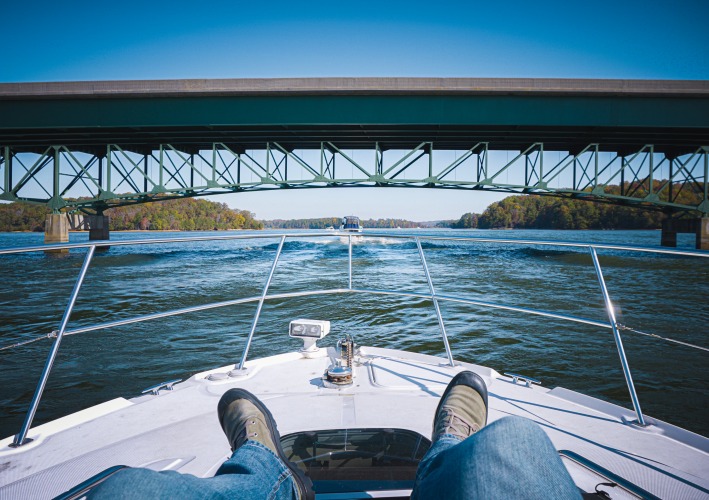
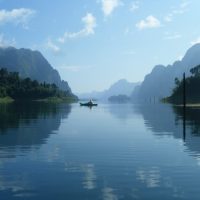
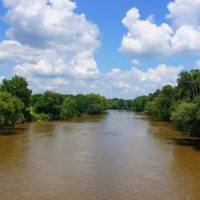
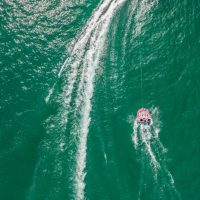
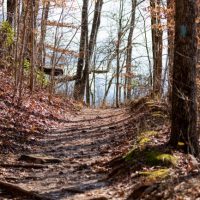
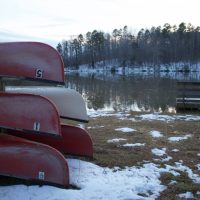
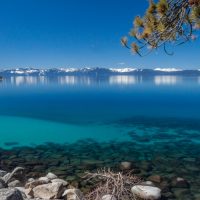





There is no alligators in Lake Lanier.
Alligators dont have a breeding population in North Georgia.
But bears do appear at Lake Lanier sometimes.
Yet there are alligators surviving in nearby creeks at Lake Lanier. They are there…
Yes there are alligators here in Lake Lanier. They are also in a creek area near the lake, and a few spotted in Tennessee.
Don’t just assume…and Lake Lanier has ghosts from the victims. I will not go/ swim in the lake.